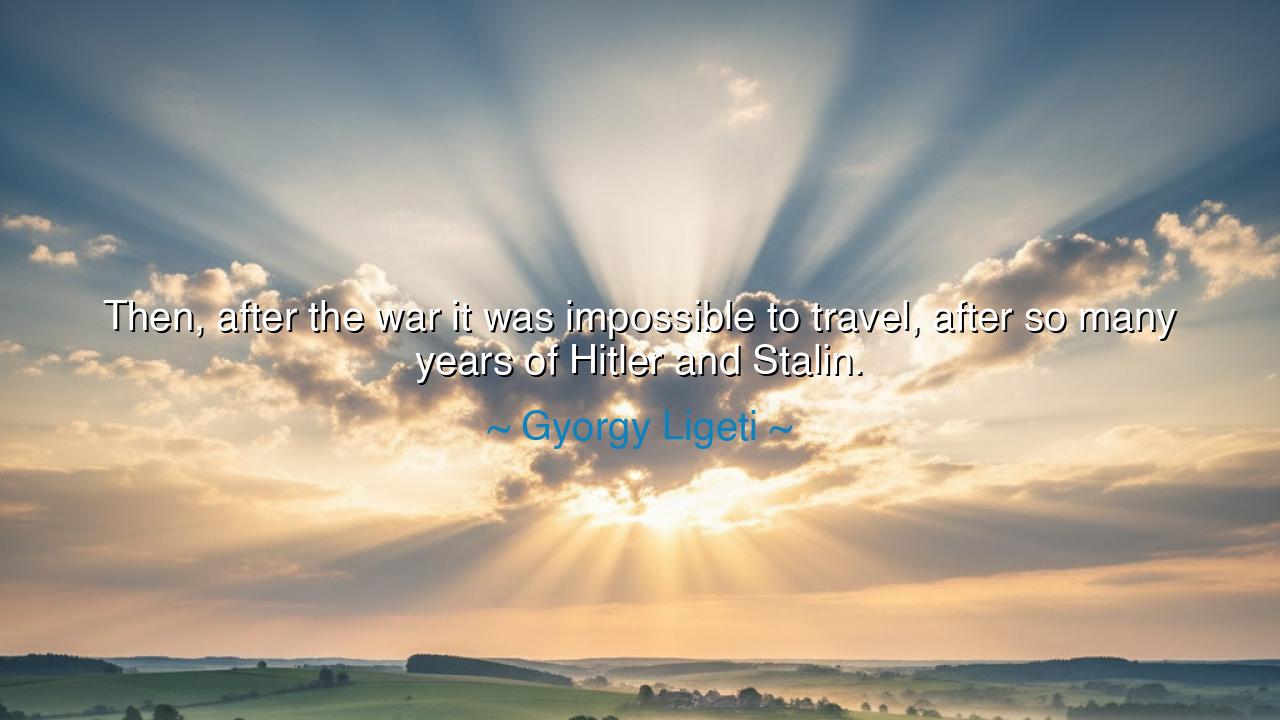
Then, after the war it was impossible to travel, after so many
Then, after the war it was impossible to travel, after so many years of Hitler and Stalin.






György Ligeti, survivor of the storms of the twentieth century, once declared with sober weight: “Then, after the war it was impossible to travel, after so many years of Hitler and Stalin.” In this phrase, there is more than a memory of hardship—there is the cry of an age. His words remind us that tyranny and war do not merely bind the body; they also bind the spirit, shutting doors, closing borders, and suffocating the natural human desire to wander, to seek, to learn. Travel, which to us may seem simple and ordinary, becomes under such powers a forbidden dream.
The ancients knew well the cost of conquest and despotism. When Xerxes marched his armies across Greece, whole peoples were uprooted, and the roads that once welcomed trade and pilgrims became highways of fear. Later, under the shadow of Rome’s collapse, Europe’s roads crumbled, and what had once been the free movement of peoples gave way to isolation. So too did Ligeti’s Hungary, first shackled under Hitler’s cruelty, then drowned in the iron grip of Stalin’s regime, find its borders turned into cages. What was lost was not merely freedom of movement, but the very sense of belonging to a world beyond the wall.
Ligeti’s words bear the pain of one who longed for exchange and discovery, yet found only barriers. After the war, Europe was divided into East and West. Those who lived under Stalin’s gaze were cut off from the rest of the world, forbidden the simple dignity of crossing a border. In such conditions, a composer like Ligeti could not hear the world’s music; he could only endure the silence imposed upon him. Thus, his art, though brilliant, was born out of isolation, and his eventual escape into the West became not just a personal liberation, but a symbolic act against the prison of dictatorship.
History is full of such imprisonments. Consider the Berlin Wall, that scar of concrete dividing a city, keeping families apart, denying to millions the basic human right to wander. For decades, it stood as the clearest symbol of what Ligeti spoke of—how the wills of tyrants can make the world smaller, how the joy of travel can be extinguished by the hand of power. Yet even then, men and women dug tunnels, flew balloons, risked bullets—all for the right to move freely. Their sacrifices reveal what Ligeti’s words conceal in grief: that freedom of travel is as essential as freedom of thought.
The lesson is as urgent now as it was then: never take freedom for granted. What seems ordinary today—boarding a train, walking into another country, exploring lands not your own—was once denied to countless millions. It can be denied again if vigilance is lost. Ligeti’s lament is not merely about the past; it is a warning to the future. Tyranny thrives when people forget how precious their freedoms are, and how easily they may vanish under the weight of authoritarian rule.
Practically, this means two things: first, to travel when you can, not merely for leisure but as an act of gratitude, of bearing witness to the openness of the world. Second, to defend freedom where you see it threatened, whether in your nation or beyond. For travel is not just movement across borders—it is the sign that humanity remains free to exchange, to encounter, to learn, to be changed. To lose it is to return to the darkness of cages.
Thus, György Ligeti’s words echo across generations: after the war it was impossible to travel, after Hitler and Stalin. But let us ensure that in our age, it is never impossible again. Let us honor his lament by treasuring the freedom we hold, by moving through the world with humility, and by defending against all who would close the roads once more. For the road is more than a path of stone—it is the path of human dignity, and it must remain open.






AAdministratorAdministrator
Welcome, honored guests. Please leave a comment, we will respond soon